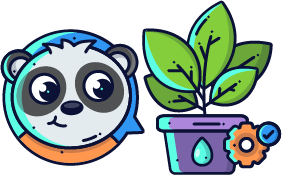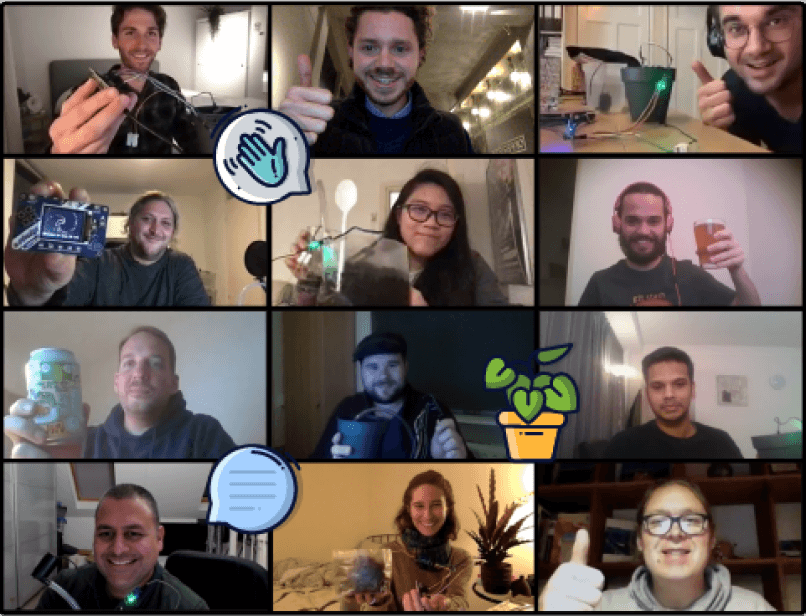State of the Software
Developer Nation
In this report
Introduction
In the tech industry, we often say that ‘software is eating the world’ and if anything, this past year has demonstrated exactly this. The acceleration of existing trends like remote work, eCommerce and digitisation have catapulted tech into the spotlight in almost every industry.
But to say that ‘software is eating the world’ overlooks a very integral part of the tech ecosystem: The people behind the curtain who spend their days building the future.
At OfferZen, we know that people are the foundation of thriving tech teams. That’s why we’ve spent the last six years investing in the tech community. Whether that’s helping developers find impactful jobs on our platform, connect at local maker events, mentor a junior developer, or write about their projects on our blog – we want to help build an inclusive, transparent, and thriving tech ecosystem.
That’s also why we put together resources like this report and its open dataset: With the help of survey responses from over 500 developers in the Netherlands, we hope to increase transparency in the industry so that developers can make informed career decisions and companies can build more impactful tech teams.
I hope you find the report as insightful as I did!

Skills & Tech Trends
Python is the language of choice in 2021 and developers are most excited about the AI and Cloud engineering industry.
The next big thing in tech? AI & cloud computing
2021's Most exciting industry for developers? AI and cloud computing
We asked developers which industry they thought was up and coming in 2021. The AI and cloud technology industry came out on top, followed by cybersecurity and FinTech.
This focus in the top three is unsurprising given that so many aspects of life and work went remote in 2020, which makes these industries more attractive than ever. Developers are also keen to use their skills to address global challenges: 1 in 5 are looking to work on problems related to environmental sustainability.
In 2021, developers want to work with Python
Given its prominence within AI and cloud computing, this might come as little surprise: The majority of developers chose Python as the language they want to work with next.
Interestingly, all the languages that round out the top 5 have applications in AI or cloud computing: TypeScript comes in second, followed by Go, JavaScript, and Rust.
Most used languages & frameworks: JavaScript reigns supreme
JavaScript is currently the most used programming language
The majority of developers are currently working with JavaScript.
Interestingly, SQL comes in second place. This suggests that database work is an important aspect of many developer roles.
Most developers work with Node.js – and most want to work with React next
Most used frameworks
- Node.js
- React
- .NET Core
Most desired frameworks
- React
- Vue.js
- TensorFlow
Node.js and React are the top two most used frameworks – which is unsurprising, given that they are frameworks of the most used programming language, JavaScript.
Here's the plot-twist: Although Node.js is currently the most used framework among developers, most indicated that they are keen to work with React next!
Not all languages and frameworks are created equal
PHP is currently the most disliked language among developers
Not all languages are created equal, and website development language PHP is the most unequal of them all: It's the most disliked language among developers.
Fun fact: 33% of Perl developers indicated a dislike for their own language, followed by 16% of PHP developers, and 14% of JavaScript developers.
Actually like PHP? ❤️ Take the survey to let us know which languages you like or dislike!
AngularJS is the most disliked framework
When it comes to frameworks, developers have a clear disdain: 1 in 5 voted AngularJS as the most disliked framework.
Even though surveyed developers indicated that React is their most desired framework, it still ranks in the top 10 of disliked frameworks.

Education and Learning
More than half of developers love to code outside of their nine-to-five – Junior developers are especially keen to keep their skills sharp.
Developers hit the keyboard at a pretty early age
57% of developers learned to code as kids
Many developers get excited about coding from an early age: Over half of surveyed developers learned to code before they turned 18.
44% of developers are self-taught
When it comes to being a developer, not all learning takes place in the four walls of a classroom.
In fact, 44% of surveyed developers indicated that they taught themselves to code.
Developers prioritise continuous learning and refining their craft
Junior developers are keen to learn new skills every few months
Developers are committed to refining their craft and keeping their technical skills sharp. 1 in 3 developers want to learn a new language every few years.
That said, the frequency of learning varies according to seniority level: While juniors tend to be more keen on learning a new language every few months, senior developers and tech managers are more likely to learn new skills every few years.
More than half of developers code as a hobby
Developers’ commitment to honing their craft extends beyond the grind of a nine-to-five: 57% of developers spend time coding as a hobby.
Interestingly, whereas junior developers are especially keen to frequently learn new skills, it appears that senior developers and tech leads are more likely to code as a hobby.

Looking for your next side project?

Careers and Job Satisfaction
Senior positions may mean more bucks, but developers are prioritising work-life balance above all else.
Benchmarking: Where are you at?
What makes a senior developer? At least 6 years of experience
Years of experience
While 6-10 years of experience seems to be the minimum requirement for this career stage, the majority of senior developers and tech leads have at least 10 years of experience.
The majority of junior developers typically have less than 2 years of experience and intermediate developers have, on average, 2-6 years of experience.
See what developers earn by seniority in the next graph.
Tech leads earn an average salary of €6 075 per month
Seniority
When it comes to developers’ salaries, seniority matters. It is unsurprising to find junior developers earning the lowest average salary and tech leads earning the highest.
We’ve included the upper and lower quartiles to give better context on the distribution of the data. The quartiles, shown by the shaded area, indicate what the top 25% and bottom 25% of developers earn.
Want to get more comprehensive salary data? 💰 Take the survey to help create transparency in the industry.
Developers want to work in holistic, human-centred work environments
Developers stay in their jobs for work-life balance, great teams, and growth
So what do developers want in their careers?
When it comes to assessing their current position, developers care about a balanced setup: Their top 4 reasons for staying in a job are a good work-life balance, great teams, opportunities for career growth and a great company culture.
These factors even trump current and future salary potential when deciding to stick in a job.
1 in 3 developers aren’t confident about career growth at their current company
While growth and learning opportunities are developers' third most important reason for staying in a job, one third of them don't seem to feel confident that their current company can offer this to them.
Developers want challenging projects and opportunities to upskill
Developers at all levels of seniority consider challenging projects their number one way to grow.
While junior developers care a lot about mentorship and training programmes, the number two most important growth opportunity for seniors and tech leads seems to be the opportunity to work on new languages and frameworks.

Are you looking for your next exciting career challenge?

Job Search
One in four developers want to leave their jobs in the next 12 months – here’s what’s making them go.
Developers change jobs frequently
More than half of developers have been in their current jobs for less than 2 years
Years in current job
The majority of surveyed developers have been in their current jobs for less than 2 years. This remains true for developers who have been working for more than 4 years.
With tech being a fast-paced and dynamic industry, developers want the opportunity to learn new skills and work with exciting tech – and taking on new job opportunities is one way to make this happen.
1 in 4 developers want to move jobs in the next 3-12 months
While half of the surveyed developers indicated a desire to remain at their current company for another two years, there's an interesting trend emerging:
One fourth are looking to move jobs within the next three to twelve months and 7% are already looking for work.
Why are developers leaving? Poor management
While the majority of developers want to stay in their current jobs for now, companies need to consider their team members’ wellbeing to retain top talent:
The number one reason for developers to leave their jobs is poor management, followed by better salary offers elsewhere and a poor work-life balance at their current workplace.
This makes sense given that developers are most likely to stay in a job for good work-life balance – and leave if it's missing.
Candidate experience can make or break a successful hire
More than half of developers have discontinued an interview process after a negative experience
Companies who don’t raise the bar on their recruitment processes could miss out on more than half of developers.
In fact, 63% of developers have discontinued an interview process after a negative experience.
A developer’s number one interview pet peeve? Not receiving feedback
Not receiving feedback after an interview or technical assessment is the number one pet peeve of developers in a hiring process.
Their second biggest pain point? Being approached for a job that doesn’t match their skillset or interests.
The good news for companies is that both of these pain points in the candidate experience can easily be fixed by adding one or two steps to a hiring process.
30% of developers are looking for work in the next year. Are you?
Take the guesswork out of your job search by having companies reach out to you directly with upfront role, tech stack, and salary information.
Find a developer jobNot job seeking at the moment? Join the OfferZen community
Demographics
The data in this report does not claim to be representative of the entire developer population in the Netherlands. Whenever the word ‘developer’ is used, it refers to the group of developers who took our #NLDevNationSurvey in 2020 and 2021.
In cases where no data slicing occurs, all 501 valid responses were included. In order to shed light on survey participant characteristics, we’ve included the demographic breakdown of all 501 valid responses below. In some cases, we decided to exclude insights on gender and ethnicity because we felt that we could not do these important topics justice in the short-form format of this report. We are, however, planning to deep-dive into these demographics in the coming months.
Origin
Gender
Age
Coding experience
Role
Industries developers currently work in
Organisation size
Methodology
OfferZen conducted a survey to find out more about developers’ skills, work experience and job search behaviour. A total of 888 people took the online survey between 30 October 2020 and 15 February 2021. Of these responses, 501 responses were counted as valid because they were from developers who are currently employed or have work experience in the Netherlands.
We hosted the survey itself on Typeform and recruited respondents via emails sent to software makers in the OfferZen community and social media posts to the public. Data was anonymised in accordance with GDPR guidelines and is housed separate to any and all of OfferZen’s platform data. Percentages may not always add to 100% due to rounding.
Salary in this report refers to gross salary before tax and excludes benefits. Statistical analysis was conducted to verify insights regarding salaries and we have only included claims where we have at least 95% confidence. The midpoint of a salary range has been taken for all insights where salary information is included.
About OfferZen
OfferZen is an online job marketplace founded by developers for developers: We believe that people are the foundation of thriving tech teams and, through this, the foundation of great software. That’s why our core business is focused on helping developers find impactful, meaningful work.
Since our start in 2016, over 100 000 software professionals and more than 1000 companies have signed up to our platform. Each interaction helps improve our matching algorithm so that hiring teams can quickly find the right team member and developers get better opportunities. We turn the traditional recruitment model on its head: Companies reach out to candidates with upfront salary, role and tech stack information.



